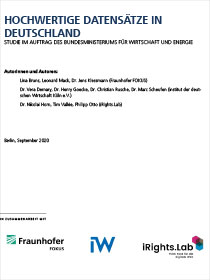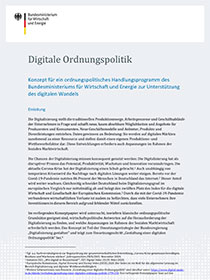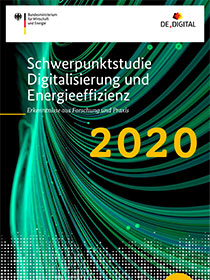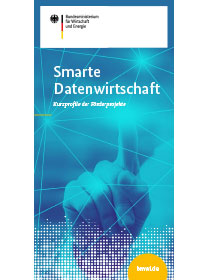A digital Europe
Shaping and mastering the digital transformation of the economy and society is a key precondition to ensure that Europe continues to be competitive. For this to happen, we need a strong Digital Single Market. The aim is to create gigabit infrastructure, a European data space and a European data economy – including an adequate policy environment for business, so that full use can be made of the possibilities for digitalisation and the potential for growth in the Digital Single Market. The digital economy and trade do not stop at national borders. Creating a European Digital Single Market is therefore the only way that ensures that companies can provide products and services that are based on the same rules and standards across the entire European Union and that companies can grow on the European market.
For this reason, the current European Digital Strategy (Shaping Europe’s Digital Strategy) addresses a wide range of issues. It intends to create a European society driven by digital technologies that provides a reliable framework for businesses and enriches people’s lives.
In addition, in the Digital Compass 2030: the European path in the digital age Communication of March 2021, the European Commission presented a target and pointed out paths towards a successful digital transformation by 2030.
The Federal Ministry for Economic Affairs and Climate Action places a particular focus on setting the right course for digital policy in the EU. This includes the issue of digital sovereignty, strengthening the semiconductor industry in Europe, recruiting skilled personnel in the ICT sector, improving communication and data infrastructures, rolling out digital technologies such as cloud computing, big data and artificial intelligence, implementing solutions for digital identities, and proper monitoring for the implementation of goals. Find out more.
Digital Europe programme
The new Digital Europe programmewill be launched in autumn 2021 to support the digital transformation. The programme is a key element in strengthening digital sovereignty. The objective is to build up and expand digital capacities and skills in key fields and to bolster the rollout (testing, application-oriented implementation and rollout) and acceptance of digital technologies. Small and medium-sized enterprises (SMEs) in particular, but also the public sector, are to benefit from this.
The programme has five specific goals: supercomputing, artificial intelligence, cyber security and trust, advanced digital skills, and the introduction and optimal use of digital capacity and interoperability. Almost €7.6 billion is available for this purpose in the 2021-2027 period.
The related regulation was published in the EU Official Journal on 11 May 2021: https://eur-lex.europa.eu/eli/reg/2021/694/oj.
Important tools for realising the programme are the planned European Digital Innovation Hubs (EDIH). These are to support businesses, especially SMEs, and the public sector as they embrace the digital transformation. The selection process for the German EDIHs is still ongoing.
The European Commission is currently preparing the first work programme to span several years and is therefore engaged in a close dialogue with the Member States. The first calls to apply for funding are expected to be published in autumn 2021.
Up-to-date information can be found on the European Commission’s overview page: https://digital-strategy.ec.europa.eu/en/activities/digital-programme
The OECD’s work on digital policy
The topic of digital policy plays an important role in the Organisation for Economic Co-operation and Development (OECD). The OECD here serves as an open forum for dialogue between policymakers, businesses and civil society, beyond the circle of OECD Member States as well.
The Committee on Digital Policy (CDEP) has the lead responsibility for the OECD’s work on digital policy, whereby Germany is represented by the Federal Ministry for Economic Affairs and Climate Action. The CDEP’s work is prepared in the four designated working groups: Communication Infrastructures and Services Policy (CISP), Measurement and Analysis of the Digital Economy (MADE), Security in the Digital Economy (SDE) and Data Governance and Privacy (DGP). The Committee and the working groups usually meet in Paris every six months. At the moment, the meetings are virtual.
Given its significance as a horizontal issue, the economic policy issues related to digitalisation are currently being prepared by the the OECD in a horizontal project, Going Digital, which entered its third work phase in the biennium 2020/21. A Going Digital Toolkit was developed in phase I; phase II focused on artificial intelligence and blockchain; phase III is dedicated to the issue of data governance for growth and well-being. The OECD’s most important publication on digital policy is the Digital Economy Outlook, which appears every two years (most recently in Nov 2020).
In addition to dialogue, the non-binding agreement of standards, i.e. soft law, in the field of digital policy remain a central goal, for example within the framework of OECD Council recommendation, most recently regarding artificial intelligence (May 2019), the broadband rollout (February 2021) and children in digital environments (May 2021).
European General Data Protection Regulation
The new European General Data Protection Regulation (GDPR) replaces the data protection directive from 1995. It provides modern answers as our economy and society become ever more digitalised. The GDPR provides an up-to-date set of European data protection rules that help find answers to how to keep data safe in an age marked by big data and new methods and types of data processing such as profiling, web tracking and cloud computing. Find out more.
European data governance
Data has enormous economic and social potential. Yet this potential can only be tapped if the data is accessible. The European Commission’s proposal for a future Regulation of the European Parliament and Council on European data governance (Data Governance Act) therefore aims to make the existing, protected data sets of public bodies usable. The draft stipulates the conditions for data sharing services and structures and processes for the secure exchange of data, for instance, by trusted third parties or data altruism organisations. In principle, the Federal Government welcomes the fact that a draft has been tabled by the Commission and submitted a statement (PDF, 235 KB) following a first assessment and appraisal of the draft Regulation on 4 March 2021.
Internet governance
Internet governance covers a large number of different fields, ranging from web domain registration rules and global IP address allocation to, in particular, general questions about the level of openness or stability of the web. The Federal Government provides input on internet governance via a number of international bodies and organisations. Germany hosted the the Internet Governance Forum of the United Nations for the first time in November 2019. Find out more.
G20
During its last G20 Presidency from 1 December 2016 to 30 November 2017, Germany hosted the first Digital Ministers’ Meeting ever to take place between the countries of the G20. Under the German Presidency, the ministers responsible for the digital economy in the G20 countries discussed the challenges and opportunities of digitalisation and drafted proposals for action. The focus was on three areas: the links that exist between digitalisation, economic growth and employment, trust and transparency in the digital economy, and Industrie 4.0. In the final ministerial declaration and in a roadmap (PDF, 427 KB, they identified eleven key fields of digital policy and agreed on a specific way forward for the future work of the G20. An overview of the results achieved as part of the Digital Ministers’ Meeting under Germany’s G20 Presidency can be found here (PDF, 83 KB).
















